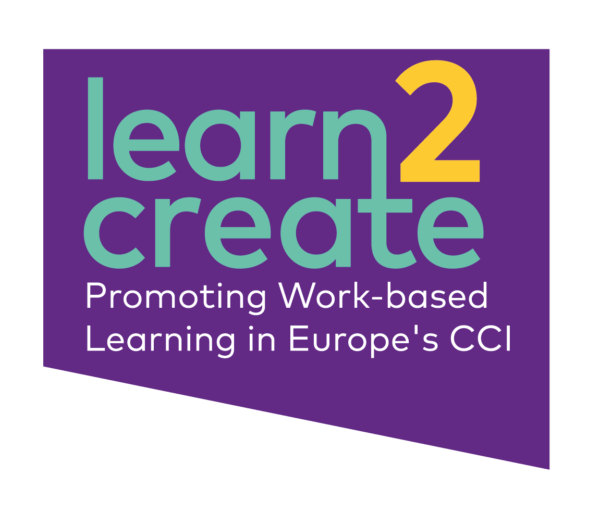he partners of the Learn2Create project focus on the development of work-based learning (WBL) in the cultural and creative industries (CCI). The consortium of L2C established a programme and educational content based on long-standing practice and cooperation with artists/creators, trainers, and teachers of vocational education and training (VET). They are
also based on a study conducted by all partners from 6 European countries at the beginning of the project (the methodological concept – more about it on the RESULTS page). It is worth
noticing that creating a course, including the blended learning method (hybrid education – offline/online), would correspond to a broad spectrum of experiences and various organisational practices, maintaining accordance with national education and training systems on a European level, was a real challenge.
One of the most important, crucial actions planned as part of the Learn2Create project was the C1 event – dedicated to learning/teaching/training. It was planned as a week-long meeting in Matera (Italy), during which 18 experienced teachers and trainers would work on verification and developing the content of the course. The goal of the meeting was also to accomplish a broad analysis of six theme ranges, resulting in the distinction of strong and weak fields of the completed course. The cooperation in the international context was meant to be a vital element of the project’s activities. Our aim was also to evaluate the course based on its effectiveness to equip teachers and trainers with skills useful in their educational practice. Unfortunately, due to the pandemic, we were forced to hold the
week-long educational course in an online form. Even though the situation caused some difficulties, it also created an opportunity, somewhat on occasion, to test the programme in the online form.
Ultimately, 15 representatives of partner organisations participated in the week-long training (from Poland, Great Britain, Italy, Spain, Greece, and Slovakia). The event was entitled “Testing the programme and educational content for VET trainers in the cultural and creative sectors”. The main goals of the meeting were: testing a part of the educational programme on the Moodle platform, discussing the data mapping process based on the educational programme, coordination of potential, vital changes in the programme and making the testing as part of IO3 more efficient. Considering the project consists of 60 different exercises and tools, the partners decided to choose exceptionally interesting areas and focus on them during this week-long training. The first day was dedicated to familiarising the participants with the entirety of the course and data mapping. The second day – entitled “self-teaching” – was focused on testing modules 1 and 2. The third day – themed “in context” was dedicated to testing modules 3 and 4. The fourth day, entitled “development’, was dedicated to testing modules 5 and 6. The fifth day was scheduled to be a hackathon – gathering all the feedback and planning the testing of the course with outside beneficiaries. The week-long training took place in January 2021. Rinova (Great Britain) was the organisation responsible for creating the structure, plan, and gathering feedback from the partners.
All the partners emphasised the value of such training. Thanks to the feedback gathered during the training week, the partners could improve some elements of the course, and find better methods of organisations, and implementing educational methods developed as part of the Learn2Create project.

All the partners agreed that among the most important needs of VET trainers and teachers working in the cultural and creative sectors is pursuing situational contexts in the broad sense, and broadening the knowledge of work-based learning. It was emphasised that the
L2C educational programme using the WBL method in the cultural and creative sectors defines an adequate knowledge range, skills, competencies, including a series of key competencies. One of the strengths of the programme is the methodology of establishing “training alliances”, offering the learners a full range of situational contexts and tasks. This
question is especially crucial considering the unique character of the cultural and creative sectors, organised in a way that is different from traditional professional practice programmes, guaranteeing the possibility of work-based learning. In the creative and cultural industries such training is usually in the master-mentee form.
The partners of the Learn2Create programme hope that tasks and tools offered by the course will be able to motivate VET trainers and teachers to engage in creative and innovative actions, associated with the promotion and usage of work-based learning.
More about the project here: https://www.learn2create.eu/pl/

